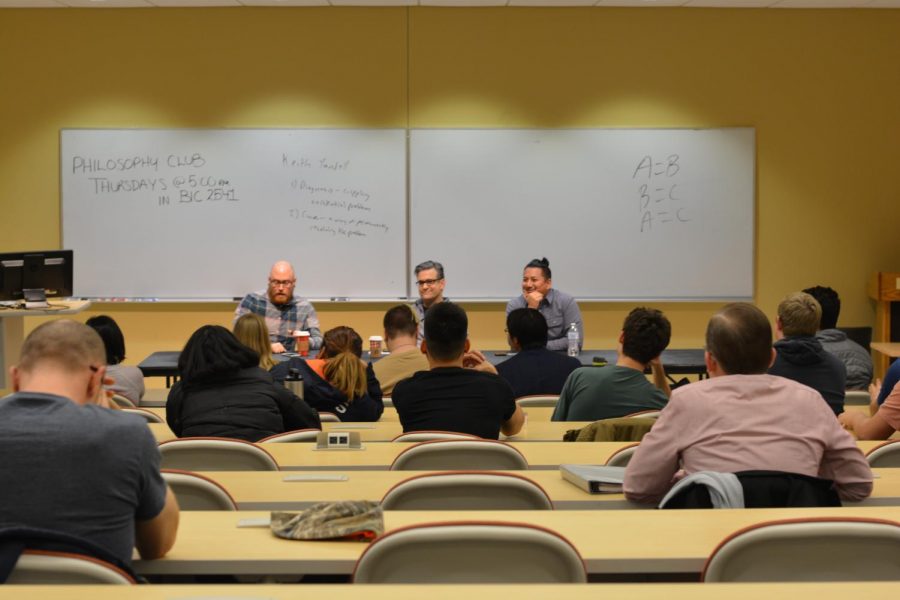Science Needs Religion: Professors go Head to Head on Controversial Topic
December 5, 2018
“My thesis tonight is a very simple one, and also very popular… Science is wonderful and important but it is not our only source of truth. Many people claim that if science can’t prove it, that we can’t really hold it as truth. However, I will argue that there are many things we know to be true that we cannot be proven by science,” Philosophy professor Peter Kanetis said.
The COD Philosophy and Religious Studies program hosted “Religion and Science: Is there a conflict between them?” On Thursday, Nov. 29 in the Health and Science Center. Moderated by Religious Studies professor, Leslie Wolf, and featuring lectures from Aaron Bartolome, Peter Kanetis and Jonathan Parsons, the seminar covered their different views on how religion and science relate.
Parsons was the first of the three professors to speak on the religion and science debate. The aim of his presentation was to summarize Stephen Jay Gould’s position that science and religion cannot even principle conflict with each other, because science and religion constitute different domains of inquiry. Parsons refuted some of Gould’s claims and gave reasons why he believed he [Gould] was mistaken.
Parsons also touched on non-overlapping magisteria, commonly known as NOMA, and contended the idea that science and religion each represent different areas of examination, which is scientific fact versus religious values.
“Science and religion are both in conflict if they both make claims about reality, and particular religions claims cannot be reconciled with our best current scientific evidence, or with what our current scientific theories say about reality,” Parsons said.
Parsons argued that scientist attempt to explain natural phenomena with natural phenomena. This is seen in science labs where experimental results are based on human observations with our five senses, hence phenomena are explained with phenomena.
He then goes on to explain the difference between value claims and descriptive claims. An example of a value claim would be, ‘pain is bad.’
“A descriptive claim would be something like, ‘non-human animals are capable of feeling pain,” Parsons said.
Following Parsons was Kanetis who spoke on the questions surrounding science being the only source of truth. He focused on scientism and reported that Scientism believes that there is no truth unless backed up or proved by science.
“Science is awesome and I am fascinated by it. But science isn’t the only way that we know. If we think that science is the only source of truth, there would be nothing inside of the box,” Kanetis said.
The box Kanetis was referring to was the truth box. The truth box is a tangible way to explain the difference between science proving an idea and using an idea. An example he used was mathematics.
“Science does not prove math, it uses math. We don’t prove two plus two with science, we prove that with math and logic,” Kanetis said. “If we have to define what truth is, do we look at a chemical reaction?”
Bartolome trailed Kanetis’ presentation by touching on whether or not naturalism has been defeated. The definition of naturalism referred to in Bartolome’s presentation came from Alvin Plantinga. Plantinga defined it as the idea that “there is no such person as God or anything like God.” Supernatural or spiritual explanations are excluded from this theory.
He briefly touched on the scientific idea of materialism which claims that a human person is wholly a material object.
Following the three presentations was an open question and answer panel for audience members to add input on the professors’ findings. The first audience question asked whether or not the three presenters agreed or disagreed with each other’s claims.
“I don’t believe that me thinking the earth is beautiful puts much evidence into there being a creator. I don’t think religion should be giving us explanations for nature. I don’t think your religious faith should rise and fall depending on their explanation of cosmos,” Parsons said.
Following Parsons response, a second audience member asked how each professor defined religion.
“It is hard to have a precise exact definition, in a philosophy class or religion class. The one area where they are alike is where they are seeking for answers. If science is not our only source of truth, then perhaps religion can give us some true insights, which would be outside the boundaries of science,” Kanetis said.
Parsons characterizes religion as an offer of savior from the limiting abilities of human existence.
“A religion includes a diagnosis and a cure or way of permanent resolution. It’s not a problem that concerns the non-sacred, it’s not a problem we can fix by having something right. There is something wrong with human existence itself,” Parsons said.
As the professors suggested potential approaches for seeking knowledge outside of the scientific method, they also revealed what has evolved from religious beliefs and practices over time. Those who are interested in Philosophy and Religious Studies are encouraged to get involved in COD’s introductory and specialized courses that dive deeper into human’s ideas and values. Beyond classes, the Philosophy Club also meets every Thursday at 5 pm in BIC 2541 where all are welcome.


















